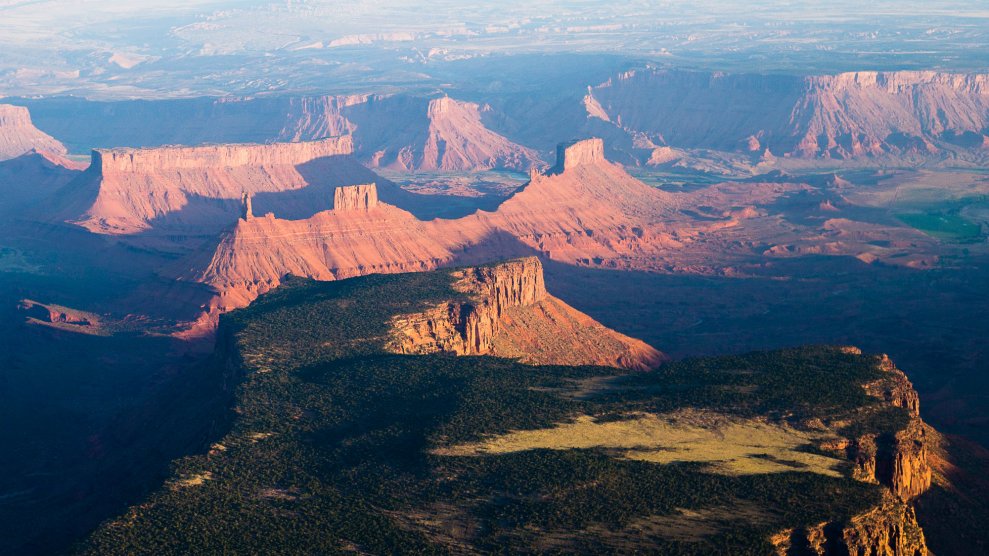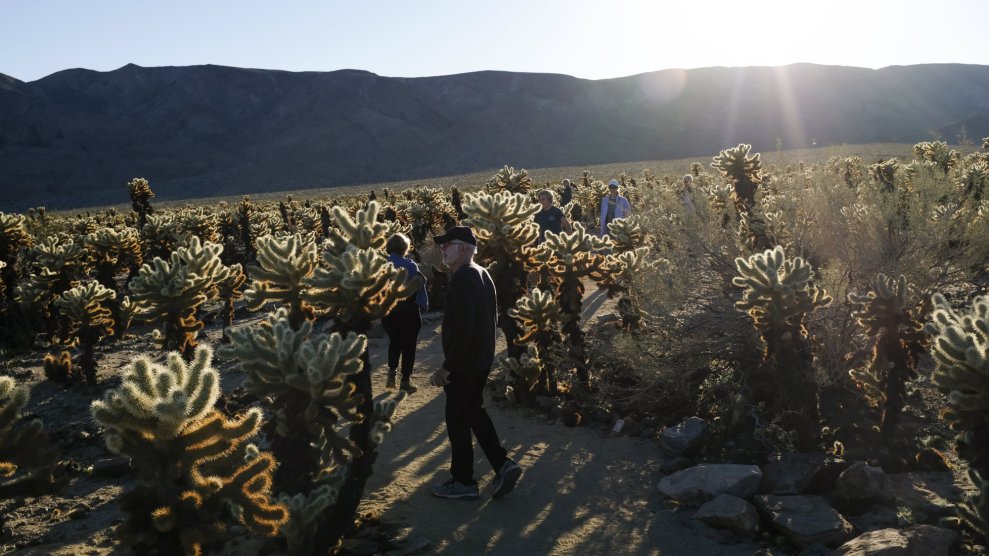
Research sites in southeastern Utah are going unchecked during the government shutdown.Eric Prado/(CC BY-NC 2.0)
This story was originally published by High Country News. It appears here as part of the Climate Desk collaboration.
In Southern Utah, there is a patch of desert heated by infrared lamps. The lamps hang just above the plants and soil crusts commonly found in this desert surrounding Moab. These lamps help scientists study how temperature increases impact plants and soils living in this already hot desert. On any given day science technicians can be seen reaching underneath the lamps to measure the size of each grass blade and the number of seeds on each shrub. The information gleaned helps land managers know what to expect from ecosystems as temperatures increase, allowing them to manage for both ecosystem integrity and multiple land uses as climate changes. During this partial government shutdown, however, the plants are going unmeasured, cutting off the continuous observations necessary for careful science and creating a gap in this long-term data set.
When the government partially shut down on Dec. 21, sending home employees from the US Geological Survey, National Park Service, Bureau of Land Management, and Forest Service, the important science being done across the country ground to a halt with consequences extending beyond the loss of plant measurements or the paychecks these employees rely on.
In parts of the West, where the economy is tied directly to the integrity of federal lands, using science to understand how these landscapes work and respond to change is essential to the economic well-being of the region. Economic drivers occurring on federal lands such as recreation, resource extraction, grazing and wildlife resources rely on science to inform evidence-based management. While research universities generate some of this science, the shear extent of public lands in the West requires the region to rely on government scientists to provide additional research about how to manage these lands.
The partial shutdown has forced federally conducted science and the science occurring on federal lands into disarray. It has delayed or canceled conferences that are necessary for research and for sharing and learning new information. Applications for research permits on federal lands and the hiring of seasonal or contractual employees has been halted. Scientists who need research funding can’t get it. My own research exploring how nutrients move through desert soils has been impacted. Ongoing work to publish research has been delayed without access to my government collaborators, and decisions about federal fellowships I’ve applied for and am relying on to complete my dissertation research with the University of Texas at El Paso have been put on hold.
In the West, the immediate impacts extend beyond the science and scientists themselves to the volunteers, educators and visitors who are no longer able to engage with the science and science-resources the region has to offer. The loss of paychecks and visitors measurably impacts our economy. The unquantified impacts do the same, damaging the science being generated with taxpayer dollars and diminishing our ability to use science to the advantage of our landscapes and economies.
While the short-term consequences of disruption to federal and federally supported science are substantial, the long-term consequences can be severe. Entire seasons of data collection may have to be canceled due to the backlog of hiring and funding that is likely to occur. Important cultural and scientific resources on public lands face the risk of vandalization or loss without federal employees and volunteers monitoring them. Over the long haul, disruptions in funding for scientists who rely on consistent access to research sites, laboratories, seasonal personnel and volunteers can easily drive top scientists away from working for federal agencies. The likelihood of losing top federal scientist to university or private sector jobs only grows as the current shutdown becomes one of the longest in US history and marks the second multi-day shutdown of 2018. Without the best minds working to understand our federal lands and pressing problems, our ability to manage and adapt suffers, and so do we.
Out in the desert the plants and soils are continuing to respond to the heat-lamp induced warming with no one to track their responses. Meanwhile the average air temperatures for the region continue to climb. As land use and climate change accelerate in the West, we all lose when avoidable shutdowns degrade our ability to understand, manage and adapt to the changing world around us. In the West, continuity in science matters. Let’s communicate to our elected officials that Westerners value consistent science funding for the betterment of the lands and economies we rely on.
















